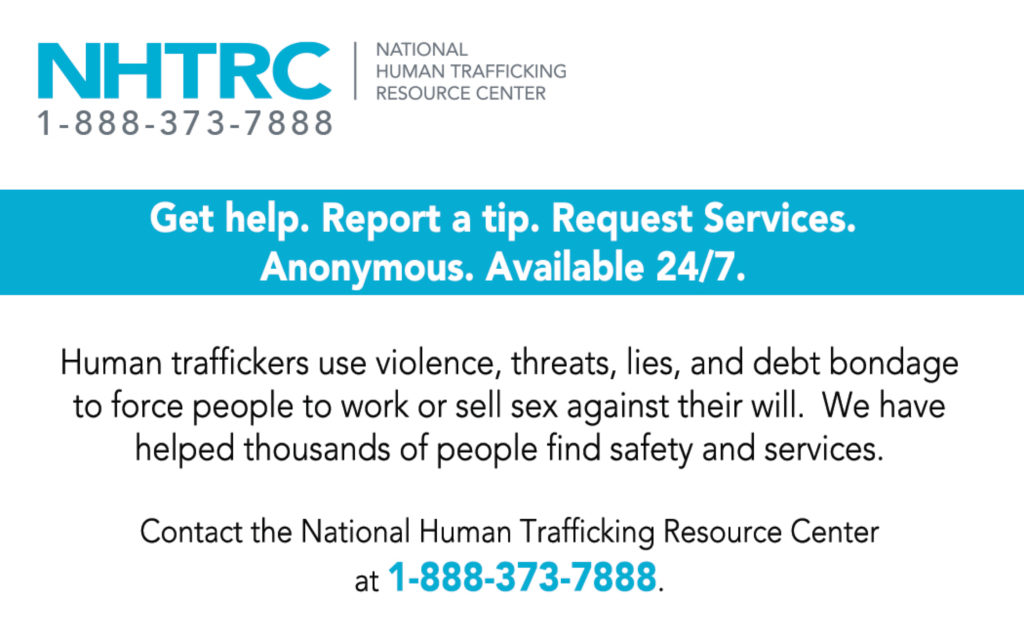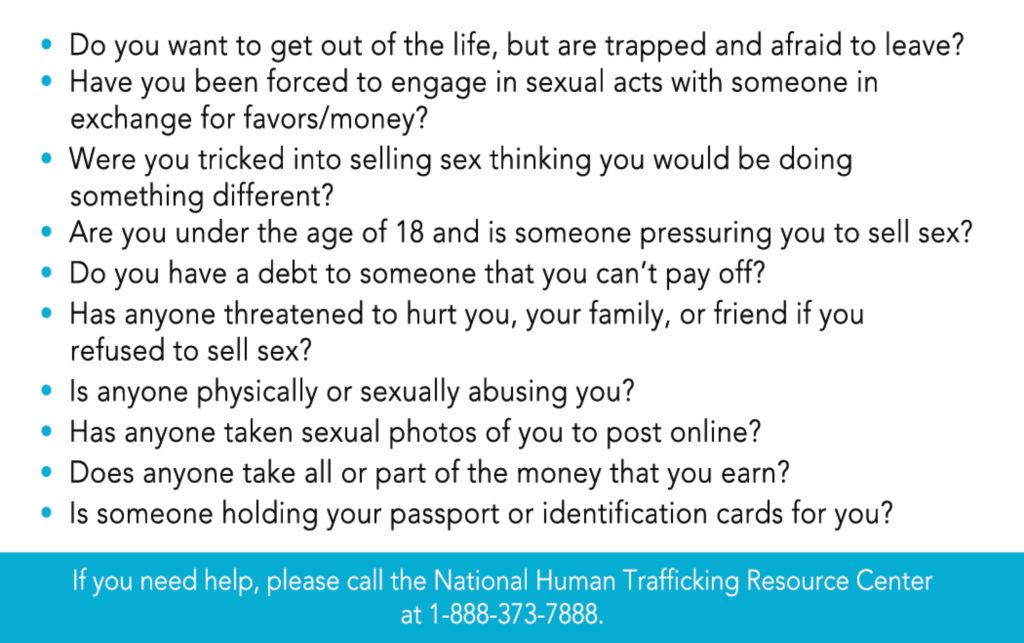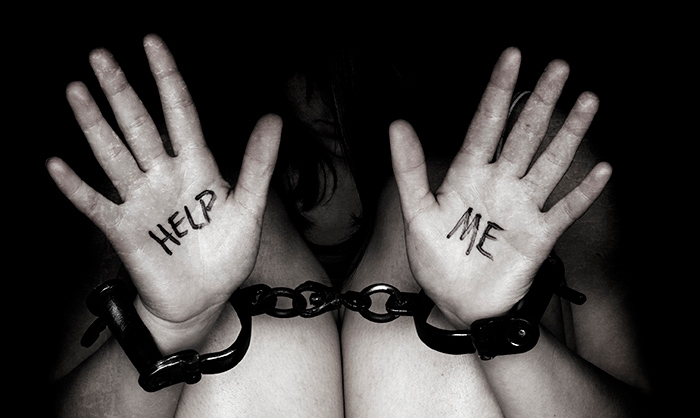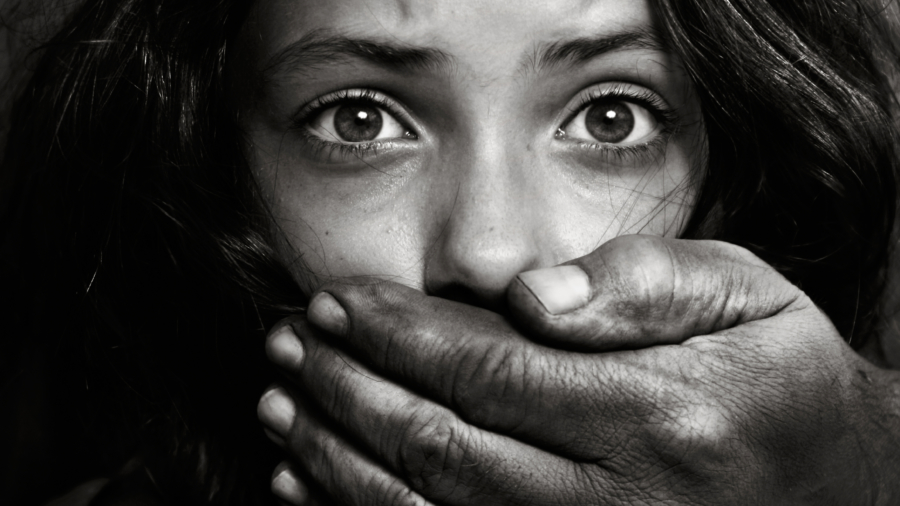A person becomes a victim of human trafficking in the form of sexual exploitation or slave labor every 30 seconds across the globe, including in the United States. Each year, 5 million new victims of human trafficking are forced into becoming commercial sex slaves. Of those 5 million, at least half and up to 60% or more are children. Human trafficking is estimated to be a $150 billion business for traffickers. Whereas selling drugs or guns involves one-time transactions, victims of human trafficking are “reusable.” Karla Jacinto of Mexico City, Mexico, for example, has shared her story of being raped up to 30 times a day, seven days a week, between age 12 and 16—up to 43,200 times. Putting a stop to this growing crisis begins with raising public awareness because the facts indicate that anyone could become a victim at any time.
Human Trafficking Defined
Sex trafficking, as defined in federal law 22 USC § 7102, is: The recruitment, patronizing, harboring, provision, soliciting, or harboring of an individual for the purposes of a commercial sex act, in which said act is induced by coercion, fraud, or force, or in which the individual induced to perform a commercial sex act is younger than 18 years old.
Labor trafficking, as defined in the same law, is: The provision, transportation, obtaining, harboring, or recruitment of an individual for services or labor through the use of fraud, force, or coercion for the purposes of subjection to involuntary debt bondage, slavery, peonage, or servitude.
Reasons to Raise Awareness About Human Trafficking
Human trafficking is a serious public threat. Although every January is Human Trafficking Awareness Month, there is a desperate need for greater public awareness, to achieve the following and more:
- To help people avoid becoming victims.
- To shine the light on areas of society in which human trafficking is prevalent.
- To learn specific strategies used by traffickers to lure children and other vulnerable individuals into sex trafficking or slave labor traps.
- To recognize signs that an individual is a victim of sex trafficking or slave labor.
Some victims are used for both commercial sex and slave labor, which federal law defines as one of the more severe forms of trafficking in persons.
Some Facts About Human Trafficking
There are many misconceptions about this modern crisis. The following are some important facts about human trafficking:
- More than 7,500 human trafficking tips were reported in 2016, and 2,075 of these tips, at least, involved U.S. citizens or lawful permanent residents.
- Sex trafficking occurs in many legal business environments, including escort services, strip clubs, and pornography operations. The setting is irrelevant because any person induced to perform commercial sex or slave labor is a victim of human trafficking.
- Human smuggling is different from human trafficking. Human smuggling violates immigration laws, and those being illegally brought into a country are consensual participants. If a person who is smuggled in is forced or coerced into slave labor or commercial sex, he or she is a human trafficking victim.
- Many sex trafficking victims do not realize that they are victims of exploitation or manipulation. Abused and vulnerable youth are the most frequent targets of sex traffickers.
Victims often fear authorities, fear retaliation by traffickers, or blame themselves. In the case of foreign nationals in the U.S., the victims often don’t know their rights.
How Do Traffickers Exercise Control Over Victims?
In a world so connected through the Internet and social media, how is it that so many people are being victimized by human traffickers?
The victims are placed in seemingly impossible situations, and they do not have access to cell phones or other electronics. The traffickers strip their victims of their identity. Identification documents such as passports, drivers’ licenses, birth certificates, and social security cards are taken from them. The victims may live in a crowded space with many others, or they may live with their employer. They are often forced to recite rehearsed or scripted answers to questions others may ask, or they are prevented from speaking with other people at all. Traffickers also use violence, deception, debt bondage, and threats on victims, to coerce them into engaging in slave labor or commercial sex against their will.
Where Do Acts of Commercial Sex Trafficking Occur?
Truck stop and hotel and motel chains are used for incidents of sexual exploitation at an alarming rate. Commercially-operated truck stops have extremely organized sex trafficking rings, and the fact that such locations are often isolated from public view and a law enforcement presence is much of the reason. The traffickers get away with moving freely with no detection or interference. Many truck stop facilities cater to their customers, becoming channels of various types of sexual exploitation, including sex with minors.
Hotels and motels often operate in a similar way, promoting and profiting from human trafficking. According to the National Human Trafficking Hotline, most calls reporting suspicion of sex trafficking involve hotels.
The Polaris Project, an organization on the frontlines of combatting human trafficking, said that an estimated 1,867 victims and survivors that were trafficked through the hotel and motel industry were identified between 2007 and 2015. Among those individuals, 92% had been victims of sex trafficking, 5% were used as slave labor, and 2% were used for both commercial sex and forced labor. Luxury hotels and low-end motels alike have been found to continually ignore evidence of human trafficking, and most have so far refused to implement anti-trafficking policies.
Human Trafficking and the Internet
The Internet has contributed significantly to the growth of human trafficking. Various social media websites are believed to be used for 86% of the child trafficking that occurs in the world. These websites have included Craigslist and Facebook.
Backpage.com is a now-closed website that was believed to have been involved in more than 73% of all reports of child trafficking in recent years. Billions of dollars were spent in advertising on the site, and words used as signals that minors were being trafficked were allegedly stripped from advertisements, so that the website wouldn’t lose out on the income from advertising. Allegedly, Backpage.com sanitized and censored words signaling that an ad involved a minor. Among those words were: “teen,” “innocent,” “Amber alert,” “daddy’s little girl,” and “young.” Once the changes had been made, the true intent of marketing children was hidden on advertisements appearing to involve legalized prostitution.
Protection Through Cyber Laws Erased
Loopholes in cyber laws allowed websites to escape liability for involvement in sex trafficking until April 2018, with the passage of the Fight Online Sex Trafficking Act (FOSTA). Previously, Section 230 of the Communications Decency Act of 1996 contained the loophole. Now its wording allows for prosecution and civil liability of websites proven to knowingly support, facilitate, or assist in sex trafficking.
Victims’ Stories
Many stories of human trafficking victims are being told, and many choose to remain anonymous. Two victims referred to as Jane Doe 1 and Jane Doe 3 said traffickers shuttled them from trucks stops to hotels in the Houston area for nearly two years.
Jane Doe 3 says her ordeal began in her senior year of high school when a boy in class she was attracted to invited her to a party. She went, and he talked her into trying methamphetamine, making her a vulnerable target.
Jane Doe 1 said she thought hotels were supposed to be safe places for families. But she would be in a room next door to families, where she would be raped by anywhere from 10 to 20 men per night. She says that her trafficker got her started at a truck stop. He dressed her in revealing clothing and instructed her to knock on the truck doors and ask if they needed anything, which was a code to indicate she had been sent there for sex by a trafficker.
Both of the girls were shocked to find that they were overlooked, as though invisible. They felt it was obvious that they were being trafficked and yet they passed right by the valet, the concierge desk, and hotel maids in the hallways. It made them feel that no one cared about their situation.
Jane Doe 1 said that people would talk to her and see that she was a teenager and yet stand by and watch men going in and out of her room. She said the hotels are failing to take appropriate actions that could help people who were being victimized.
In Texas, where these stories unfolded, the law says that companies, their shareholders, and their executives can all be held civilly liable if they knowingly or intentionally profit from human trafficking.
In the past 10 years, Polaris Project has recorded more than 3,300 human trafficking cases in hotels, though they say that number is not an accurate representation of the full extent of the crisis.
How to Identify a Victim of Human Trafficking
Various organizations and businesses provide tips for recognizing a possible victim of human trafficking. They also suggest some questions that can be asked of the victim and actions you can take to alert authorities.
The following can be red flags or signs that a person is a victim of human trafficking:
- Appears to be in a relationship with a person who is dominating over them.
- Is never alone or someone always answers questions or translates on their behalf.
- Tearfulness.
- Appearing depressed, which may be manifested by looking fatigued, restless, sad, or hopeless.
- Has no documents for identification.
- Has unexplained cuts, bruises, or other signs of physical abuse.
- Unable to provide an address on where they live.
- Inconsistent details when relaying their story.
- Under age 18 and providing commercial sex acts or any age unwillingly performing commercial sex acts.
- Expresses fear of law enforcement or receiving help from any outside entity.
- No control of their own finances.
- Unable to schedule appointments or leave their residence or job.
Questions to ask a possible victim of human trafficking, if able to get him or her alone:
- Are you being threatened?
- How did you get those bruises? Is someone hurting you?
- Are you free to leave your house or job whenever you want?
- Are you paid for your job, and is it fair?
- How many hours per week do you work?
- Do you owe a debt to someone?
- Do you live near or with your employer? Are there locks on windows or doors from the outside, where you live?
Take the following actions, if you suspect a person is a victim of human trafficking:
- Ask the individual if you can help them to go immediately to a safe place.
- If time is needed, create an action plan to provide them a safe place, for when they are ready.
- Call the human trafficking hotline at 1-888-3737-888 or have the victim call the number. The hotline has language capabilities.
Sex Trafficking Cases in the News
According to a CNN story published May 8, 2018, the U.S. Olympic Committee (USOC) and taekwondo stars have been accused of sex trafficking. Four women who trained with a team of two brothers, including one Olympic gold medalist, have accused the U.S. Olympic Committee of ignoring reports of sexual abuse. They have accused the brothers involved with assault, rape, and other types of misconduct. USOC and USA Taekwondo are both accused of knowingly participating in sex trafficking and with allowing young women to be sexually abused by the brothers, who were involved with taekwondo.
In October 2, 2018, news from Reuters, Facebook has been sued by a woman who claims the social media website enabled sex trafficking. At the age of 15, she claims to have been raped, beaten, and sex trafficked by a pimp who had invited her to be a friend on Facebook. The woman alleges that executives of the social network were aware that their platform was being used to lure minors into the sex trade.
Legal Recourse for Human Trafficking Victims
Attorneys at The Johnston Law Group are involved with efforts to represent victims of human trafficking in civil lawsuits against employers that participate in sex trafficking and forced labor. The Trafficking Victims Protection Reauthorization Act of 2003 (TVPRA) is federal legislation allowing for this type of legal recourse. If you or a loved one has been a victim of human trafficking, contact the professionals at the Johnston Law Group by calling 844-464-0062 today.



Stephanie McHugh
Stephanie McHugh is a professional writer who specializes in legal articles, technical blogs, and website copy. She is a former Official Court Reporter for a District Court in Houston, Harris County, Texas; newspaper columnist; and teacher. Stephanie is a professional writer with extensive experience reporting on health-related topics for publication. She developed an interest in health-related litigation as a court reporter while taking depositions for a class action lawsuit. Through her writing, she has been glad to help raise awareness about public health threats, to benefit victims.

If you are in immediate danger, contact 911.
For assistance, call the National Human Trafficking Hotline at 1-888-373-7888. You can reach the Hotline 24 hours a day, 7 days a week in more than 200 languages. All calls are confidential and answered live by highly trained Anti-Trafficking Hotline Advocates.
Source
https://polarisproject.org/current-federal-laws
https://humantraffickinghotline.org/what-human-trafficking/federal-law
https://www.britannica.com/topic/Communications-Decency-Act
https://www.apnews.com/6b899ca752154db18e1f74acc792b614
https://www.cnn.com/2018/05/07/us/taekwondo-lopez-brothers-lawsuit/index.html
https://www.cnn.com/2015/11/10/americas/freedom-project-mexico-trafficking-survivor/index.html


